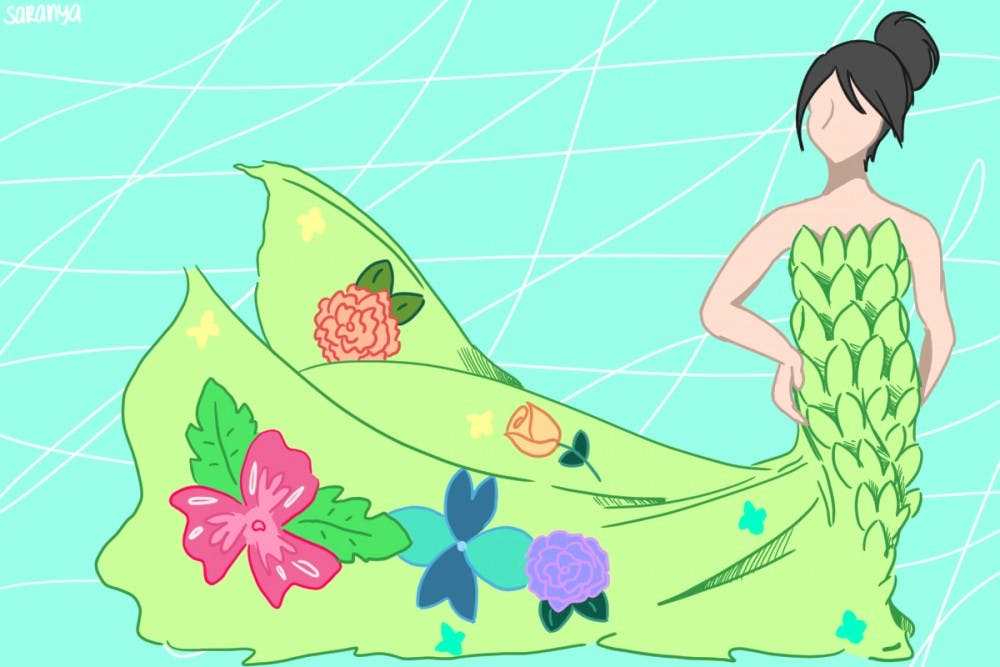I love shopping. Getting new clothing makes me feel special and happy. But it took me a long time to realize that buying a piece of clothing does not just have an effect on you, it affects every part of the world around you. The companies that make vast majority of widely available clothing are known as “fast fashion”—think retailers like Zara, H&M, Forever 21. Fast fashion is terrible for human rights, the environment, and invention.
President of the Climate Reality Project, Kalyxa Roman (W ’20) thinks that a lot of people don’t see the effects of the fashion industry because “we’re very privileged, we’re the ones consuming fast fashion. But the people that are in these countries where our fast fashion retailers are producing are facing the consequences.”
One of these consequences came in 2013 when a garment factory building collapsed and killed 1,127 people in the industrial suburb of Dhaka, Bangladesh. According to activists, the workers in that building produced clothing for Walmart, the Dutch retailer C & A, Benetton and Cato Fashions. The buildings were clearly unsafe and factory owners were still encouraging employees to come to work. For many large companies that need to produce lots of pieces quickly, this is the norm. Even in the United States, some workers make very little, like in this one case of California factory workers making $6 an hour, which is below minimum wage in the state. Over 300 of these complaints have been filed since 2007 by workers demanding back pay for producing Forever 21 clothing.
Fast fashion also has a terrible impact on the environment. According to a report by the Ellen MacArthur Foundation, the textile industry creates more greenhouse gas emissions than international shipping and aviation combined. The production of clothes worldwide has more than doubled since 2000, and the average person now buys 60 percent more pieces of clothing every year and keeps them for about half as long as they did 15 years ago. Since people go through fashion so quickly, 12.8 million tons of clothing are sent to landfills in the US every year, where they sit and leave toxic chemicals and dyes to contaminate soil and groundwater.
Since fast fashion companies need to produce new items so quickly, they often rely on other designers ideas for new pieces. Reproduction is usually fine for big design houses, but for smaller independent designers, this can be financially devastating.
Companies can get away with this in the United States because garments and accessories are considered “useful items,” and therefore cannot be copyrighted. There is even a popular Instagram account @DietPrada, which is entirely dedicated to calling out copycat designs and the companies that produce them.
When I learned about this, I was deeply upset, because I had been feeding this industry for my entire life without even giving it a second thought. Despite my love for clothing and accessories, I stayed away from buying anything new for a while. But, there came a time when I needed a new outfit, and when researching what to get, I learned that if you look hard enough, you can find many companies that make amazing, sustainable clothes.
Generally, thrifting is the best way to look for new clothes or satisfy a shopping craving without buying into fast fashion. You're buying used pieces and giving them a new life, generally at a very reduced price. Also, the feeling you get when you sort though so many pieces and find exactly what you were looking for is amazing.
There are some national chains like Goodwill, and Salvation Army, that are always good for cheap finds. Buffalo Exchange is generally more expensive, but you also have to sort through a lot less clothing. Some great local stores are Philly Aids Thrift, Then Second Mile Center, The Wardrobe Resale, and of course Penn Closet in Williams Hall.
Online thrift shopping is another great option for students. Websites like Depop, ThreadUp, and Poshmark, let people resell their clothes, and you can purchase great items at a reduced price. Another benefit of this, is you can use the website to easily find what you want and you don’t have to sort through anything yourself.
Otherwise, sustainable retailers are a great resource. Because these clothes are made ethically, they are generally higher priced, but are also usually higher quality and will last longer. For outdoorsy clothes and daywear made out of recycled materials, Patagonia and United By Blue are both companies that do their part in helping the environment. United by Blue removes one pound of trash from the water for every piece of clothing sold and Patagonia donates 1% of their sales to “community–based groups working to create positive change for the planet.” For fun pieces to add to you everyday or work wardrobe, Everlane and Reformation provide an environmentally–conscious, ethical choice. Other sustainable clothing–brand options include People Tree, pact, and Raven + Lily.
The biggest thing to do in curbing your fast fashion habit it to realize you'll never be perfect. Even though she tries her hardest to thrift shop, Kalyxa says, “sometimes I’ll buy from like Macy’s or Gap, but I try to to do to that very rarely. I think [that] as long you buy pieces that you know you are gonna get a lot of wear out out of, and like are going to last long, that you're not going to to trash in like a month, then that's fine."







